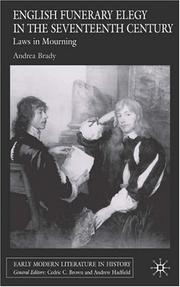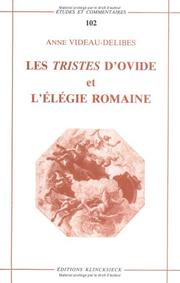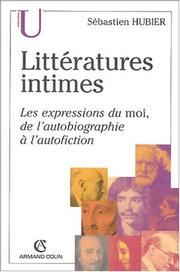| Listing 1 - 10 of 12 | << page >> |
Sort by
|
Book
ISBN: 2757418521 2757413783 Year: 2017 Publisher: Villeneuve d'Ascq : Presses universitaires du Septentrion,
Abstract | Keywords | Export | Availability | Bookmark
 Loading...
Loading...Choose an application
- Reference Manager
- EndNote
- RefWorks (Direct export to RefWorks)
Ce livre est né de la confrontation, a priori paradoxale, entre une théorie sémiotique contemporaine (la réflexivité - ou l'autoréférence - textuelle) et un domaine de référence bien antérieur à son avènement (la poésie latine). Son premier devoir fut donc d'en fonder la légitimité. Ce fut chose aisée, car si la littérature réflexive, dont cette théorie est issue, est apparue au xxe siècle, la réflexivité en littérature est, elle, un phénomène beaucoup plus ancien, aussi ancien sans doute que la littérature elle-même, c'est-à-dire, dans notre tradition occidentale, que la poésie. Les « boucles de l'autoréférence », comme on les désigne parfois aujourd'hui, se déploient largement en effet dans la poésie antique. Le fait est évident s'agissant de ces « poèmes poétologiques » grecs qui ont pour sujet l'écriture d'un poème, voire la représentation de leur propre genèse ; il l'est aussi, bien que de façon plus discrète ou plus fugitive, pour un grand nombre d'œuvres de tous genres qui, tout à la fois, « disent et montrent qu'elles disent », au moyen des procédés les plus divers, au premier rang desquels figure l'allégorie. Sortie toute casquée d'une mère grecque, la poésie latine fut en ce domaine aussi son héritière ; et la naissance qu'elle raconte, la sienne, inclut cet héritage : car elle se dit voyageuse étrangère, venue de l'Orient pour s'installer en terre romaine, et fait de ce métissage originel l'instrument de son destin insigne et la marque indélébile de son identité. Based on the confluence of contemporary semiotic theory and a much older literary field, this book contributes to the study of the specific means of self-reference in Latin poetry.
Poetry --- théorie littéraire --- comédie --- épopée --- images métapoétiques --- autoréférence --- poésie latine --- élégie --- bucolique
Book
ISBN: 3425047116 9783425047119 Year: 1977 Publisher: Frankfurt am Main : Diesterweg,
Abstract | Keywords | Export | Availability | Bookmark
 Loading...
Loading...Choose an application
- Reference Manager
- EndNote
- RefWorks (Direct export to RefWorks)
Elegiac poetry, Latin. --- Elegiac poetry, Latin. --- Elegie. --- Liebe. --- Love poetry, Latin. --- Love poetry, Latin. --- Latein. --- Römisches Reich.
Book
ISBN: 9789004452947 9789004116030 Year: 2000 Publisher: Leiden; Boston : BRILL
Abstract | Keywords | Export | Availability | Bookmark
 Loading...
Loading...Choose an application
- Reference Manager
- EndNote
- RefWorks (Direct export to RefWorks)
This volume contains the first translation into English of all the major love poetry of the Renaissance neo-Latin poet Johannes Secundus and the first detailed critical appreciation of the first two books of his Elegies and the Elegiae Sollemnes. The book consists of an introduction (on the poet's life and works, characters in and dating of the amatory elegies, literary background etc.), facing Latin text and English translation of the Elegies, brief explanatory notes and full essays of appreciation, an appendix with a translation into English of the Basia and Epithalamium , and an index. This work contains extensive amounts of valuable information about Secundus' models, wit, style, sound, diction, placement, structure, manipulation of characters and themes, generic innovation etc. and facilitates a complete reappraisal of this major Renaissance love poet.
Book
Abstract | Keywords | Export | Availability | Bookmark
 Loading...
Loading...Choose an application
- Reference Manager
- EndNote
- RefWorks (Direct export to RefWorks)
eebo-0018
Book

ISBN: 9791030005257 2903440859 Year: 2020 Publisher: Pessac : Presses Universitaires de Bordeaux,
Abstract | Keywords | Export | Availability | Bookmark
 Loading...
Loading...Choose an application
- Reference Manager
- EndNote
- RefWorks (Direct export to RefWorks)
L’exil, épreuve de la séparation, existe clans l’humanité depuis la nuit des temps, comme si faisait partie de l’humaine condition, le fait de ne pouvoir demeurer en la terre de ses pères. C’est à une libre traversée parmi les exilés, les parias, les héros, ou les poètes, comme autant d’images tout à la fois pathétiques et vivifiantes de notre condition mêlée, qu’invite ce recueil.
Literature (General) --- mythe --- liberté --- religion --- littérature --- identité --- exil --- nomadisme --- tragédie --- épopée --- altérité --- langue maternelle --- élégie --- nostalgie --- genre littéraire --- altération --- arrachement --- déracinement --- entre-deux --- langue d’adoption --- pollinisation des langues --- littérature migrante --- littérat
Book
ISBN: 0874719399 0851150756 9780851150758 9780874719390 Year: 1977 Publisher: Ipswich Boydell Press
Abstract | Keywords | Export | Availability | Bookmark
 Loading...
Loading...Choose an application
- Reference Manager
- EndNote
- RefWorks (Direct export to RefWorks)
Poetry --- English literature --- Poésie anglaise --- --Élégie --- Elegiac poetry, English --- Shelley, Percy Bysshe, --- Tennyson, Alfred --- --2283 --- History and criticism --- Milton, John, --- Gray, Thomas, --- Arnold, Matthew, --- Criticism and interpretation --- --Elegiac poetry, English --- --History and criticism --- Élégie --- Elegiac poetry, English - History and criticism --- Milton, John, - 1608-1674 --- Gray, Thomas, - 1716-1771. - Elegy written in a country churchyard. --- Arnold, Matthew, - 1822-1888 - Criticism and interpretation --- Shelley, Percy Bysshe, 1792-1822 --- Arnold, Matthew, - 1822-1888
Book
ISBN: 8859604885 9788859604884 Year: 2009 Publisher: Firenze : Prato : Polistampa ; Centro di Studi sul Classicismo,
Abstract | Keywords | Export | Availability | Bookmark
 Loading...
Loading...Choose an application
- Reference Manager
- EndNote
- RefWorks (Direct export to RefWorks)
Elegiac poetry, Latin (Medieval and modern) --- Elegie. --- Epigramm. --- Epigrams, Latin (Medieval and modern) --- Latin poetry, Medieval and modern --- Lyrik. --- Rezeption. --- History and criticism --- Latein. --- Neulatein. --- Latin literature, Medieval and modern --- Latin epigrams, Medieval and modern --- Latin elegiac poetry, Medieval and modern

ISBN: 9781403941053 Year: 2011 Publisher: Houndmills, Basingstoke, Hampshire [England] ; New York : Palgrave Macmillan,
Abstract | Keywords | Export | Availability | Bookmark
 Loading...
Loading...Choose an application
- Reference Manager
- EndNote
- RefWorks (Direct export to RefWorks)
"This book situates elegy's conventions within the rituals of rhetoric and mourning. Drawing on anthropology to analyse transitional rites, charismatic dying and the performance of grief, it offers new readings of famous poems, as well as little-known texts published in manuscript and popular print. It recontextualizes elegies commemorating heraldic funerals and public executions, to reveal how poets asserted their independence and unique status by manipulating the rituals designed to affirm consensus and the power of the state. Examining three famous executions of the 1640s, critical elegies for other poets, and poems mourning the death of children, Andrea Brady reveals the radical potentiality of the elegiac genre. This book provides new contexts for canonical elegies by Ben Jonson, John Donne, Henry King and John Milton, among others, and introduces a set of questions about the relationship between private experience and public morality, the body and creativity, and death and writing."--Jacket.
Bestattung

ISBN: 2252027606 9782252027608 Year: 1991 Volume: 102 Publisher: Paris Klincksieck
Abstract | Keywords | Export | Availability | Bookmark
 Loading...
Loading...Choose an application
- Reference Manager
- EndNote
- RefWorks (Direct export to RefWorks)
Poetry --- Classical Latin literature --- Ovid --- Ovide, --- "Tristes" --- Poésie latine --- --Élégie --- Poets, Latin --- Epistolary poetry, Latin --- Elegiac poetry, Latin --- Politics and literature --- Exile (Punishment) in literature --- Exiles in literature --- Exiles --- 2281 --- 2283 --- Homes and haunts --- History and criticism --- Ovid, --- -Epistolary poetry, Latin --- -Exiles --- -Exiles in literature --- -Poets, Latin --- -Latin poets --- Literature --- Literature and politics --- Persons --- Aliens --- Deportees --- Refugees --- Latin epistolary poetry --- Latin poetry --- Latin elegiac poetry --- -Political aspects --- Constanta (Romania) --- -Rome --- -In literature --- In literature --- Exile (Punishment) in literature. --- Exiles in literature. --- History and criticism. --- -History and criticism --- -Constanta (Romania) --- Latin poets --- Tristes --- --Poésie latine --- --Poets, Latin --- Élégie --- Poets, Latin - Homes and haunts - Romania - Constanța --- Epistolary poetry, Latin - History and criticism --- Elegiac poetry, Latin - History and criticism --- Politics and literature - Rome --- Exiles - Rome --- Ovid, - 43 BC-17 AD or 18 AD - Tristia --- Ovide, 43 av JC-18

ISBN: 2200263333 9782200263331 Year: 2003 Publisher: Paris Colin
Abstract | Keywords | Export | Availability | Bookmark
 Loading...
Loading...Choose an application
- Reference Manager
- EndNote
- RefWorks (Direct export to RefWorks)
Comparative literature --- Autobiography --- Autobiographie --- 82-94 --- Dagboek. Memoires. Autobiografie --- Autobiographie dans la littérature. --- Moi (Psychologie) dans la littérature. --- Intimité dans la littérature. --- Moi (Psychologie) --- Autobiographie. --- Moi dans la littérature. --- Roman autobiographique. --- Intimité (psychologie) dans la littérature. --- Moi --- Roman autobiographique --- autobiographie. --- roman autobiographique. --- Intimité. --- Moi. --- Thème littéraire. --- Litterature --- Elegie --- Dans la littérature. --- Histoire et critique. --- Intime --- Je --- Histoire --- Critique --- Intimite --- Psychologie --- Autofiction --- Journal --- Memoire --- Roman --- Epistolaire --- 82-94 Dagboek. Memoires. Autobiografie --- Moi (Psychologie). --- Autofiction. --- Epistolaire.
| Listing 1 - 10 of 12 | << page >> |
Sort by
|

 Search
Search Feedback
Feedback About UniCat
About UniCat  Help
Help News
News